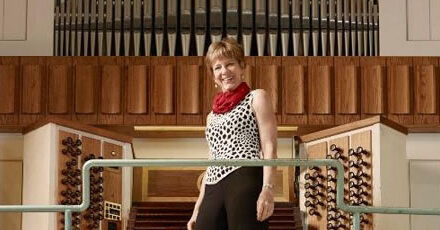Leesville Road High School Symphonic Band Vol. II: Music by Robert Jager, Bach, Dan Welcher, Grainger, Frank Ticheli, Hindemith, Rossini, & Wagner. David S. Albert, conductor, recorded 2000-2. DDD; 66:30. $10; ordering instructions are online at http://leesvilleband.org/band_items_for_sale.htm , or call 919/870-4297.
55th Annual Midwest Clinic (Chicago, 2001): Leesville Road High School Symphonic Band, David S. Albert, conductor, Eric Petschke, student conductor, & Michael Votta, Jr., Ronnie Wooten, & Jack Stamp, guest conductors. Music by Smith, Grafulla-Reeves-Fennell, Grainger, John Barnes Chance, Jared Spears, Alford-Williams, Stamp, Rolf Rudin, & Offenbach-Bourgeois. 39:18. $10; ordering instructions are online at http://leesvilleband.org/band_items_for_sale.htm , or call 919/870-4297.
Several years ago, writing for another paper, I had the pleasure of hearing the Leesville Road High School Symphonic Band’s first CD. It was an eye-opener for a guy who has watched with increasing alarm the decline of serious music education and music-making in our public schools. Leesville Road isn’t an arts magnet school, but for some reason it seems to be doing things the right way. It is clear that the school has a talented group of music professionals on staff and that the administration there, the parents, and the students all appreciate and support the music programs that are in place. The results are readily apparent at their concerts, several of which I have heard, and on the two recordings under review here.
The second of these is basically a souvenir of the 2001 Chicago band conference and clinic at which the Leesville Road group represented North Carolina. As such, it is likely to be of interest primarily to the participants and their families, but the recording is excellent, the playing is remarkably fine, and it is a treat to hear the young musicians under their own regular conductor and a batch of guest stick-wavers. Among these, Votta and Stamp will be familiar to Triangle music lovers, for the former is now based at UNC and the latter has conducted here. What sets this CD apart from many others like it (and there are scads of these things, abroad in the land, made by choirs and orchestras and bands almost everywhere) are the high quality of the performances, which are apparently unretouched, and the comparably high quality of the music itself. Two examples will serve to illustrate these point: Stamp leads his own “Ricercare,” eliciting a performance that glows from within (and carries with it a measure of unimpeachable authority, as recordings conducted by composers often do); and the Galop from Offenbach’s Genevieve de Brabant , hardly a heavy-weight piece (and not intended for band, in its original incarnation), is at once a marvelous introduction to one of the classical world’s most enchanting composers – an introduction for the students and, in all likelihood, for others purchasers of the CD, too – and a reminder that Sousa, too, mined the opera for the main theme of the Marines’ Hymn! (Please note that the penultimate cut on this CD is directed by Albert, not by Tom Bennett, as indicated on the outside cover.)
The first CD listed above will surely carry greater appeal for collectors and music lovers in the Triangle and beyond. It, too, features some superior playing – the band sounds as good as some of the best college-level groups and much better than many – and the program is, if anything, even more impressive than the other new release. Bach’s Toccata and Fugue in D Minor, given in a transcription by Erik W.G. Leidzen, is not the equal of the several orchestral adaptations that used to enjoy widespread fame, but it’s worth remembering that it was through arrangements like this that many, many music lovers first discovered Bach, back in pre-historically-informed-performance days. Dan Welcher’s “Zion” has become a staple of symphonic bands, including more than a few fully-professional ensembles. The CD’s three concluding works – an uncredited arrangement of the March from Hindemith’s Symphonic Metamorphosis on Themes of Carl Maria von Weber , a transcription by Leidzen of Rossini’s William Tell Overture, and the Procession to the Cathedral from Wagner’s Lohengrin (trans. Merlin Patterson) – consume a third of the CD’s time and space and will surely amaze listeners who doubt that a high school ensemble in a non-arts-magnet setting can cut the mustard: these Leesvillers do, with considerable aplomb. Perhaps there’s hope for serious music in our public schools, after all – even if the impetus for it, in this instance, comes from within, rather than from Central Admin.
Proceeds from the sale of these CDs support the music programs at Leesville Road High School.












